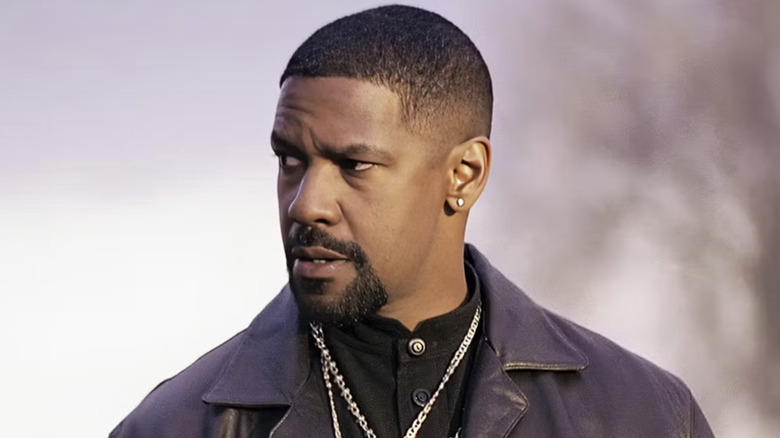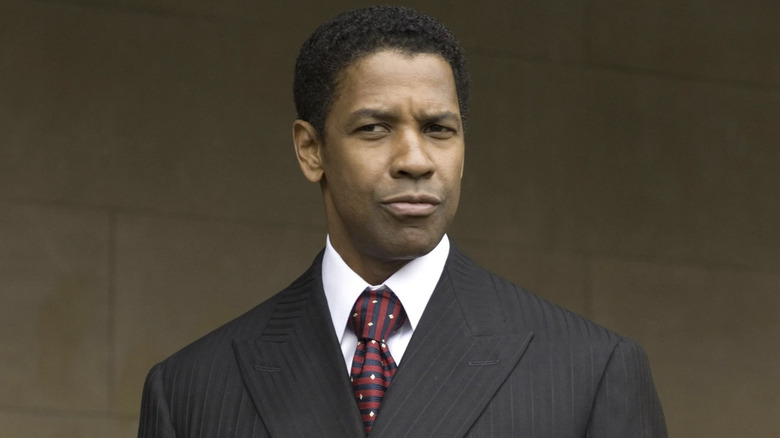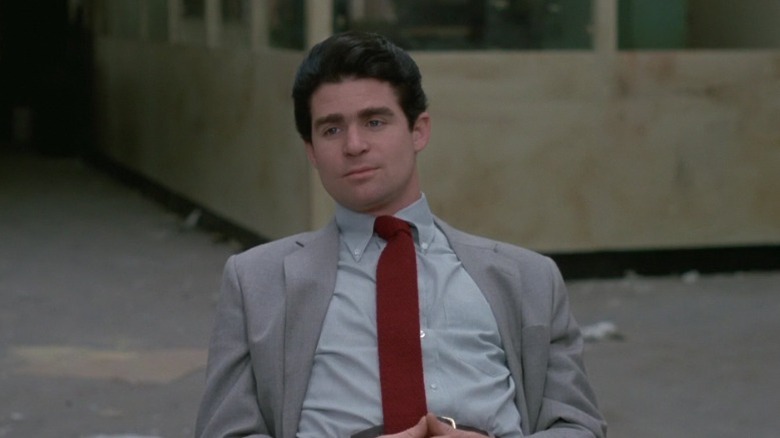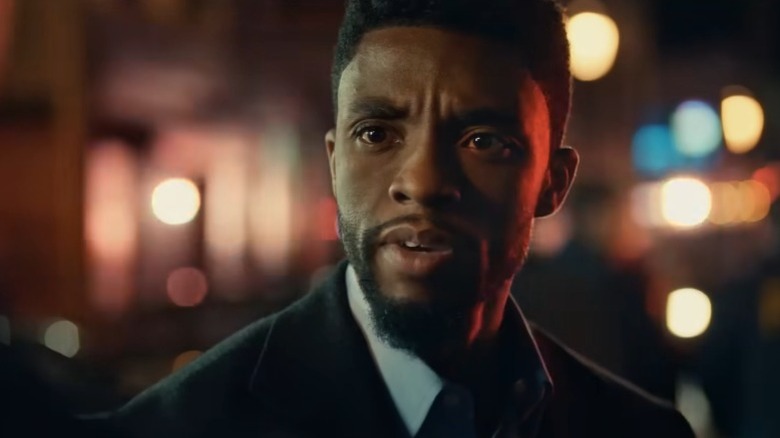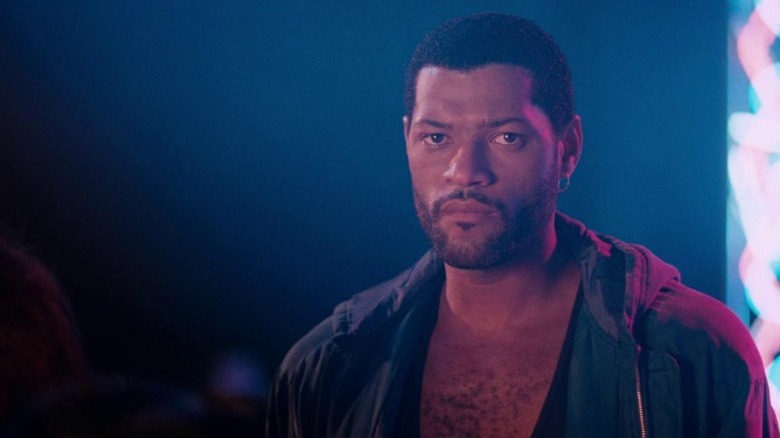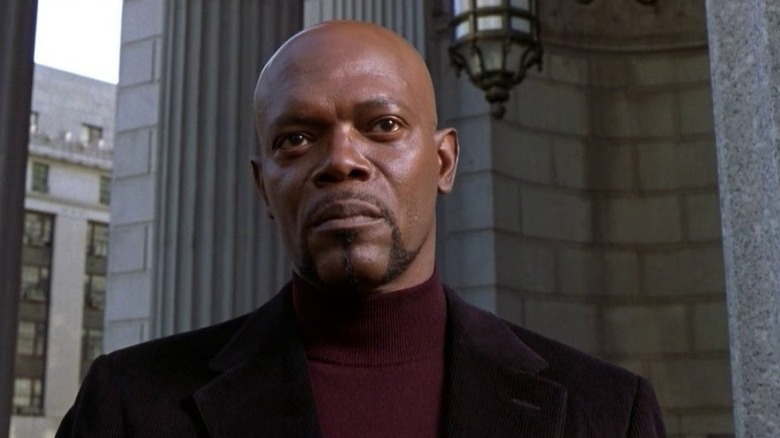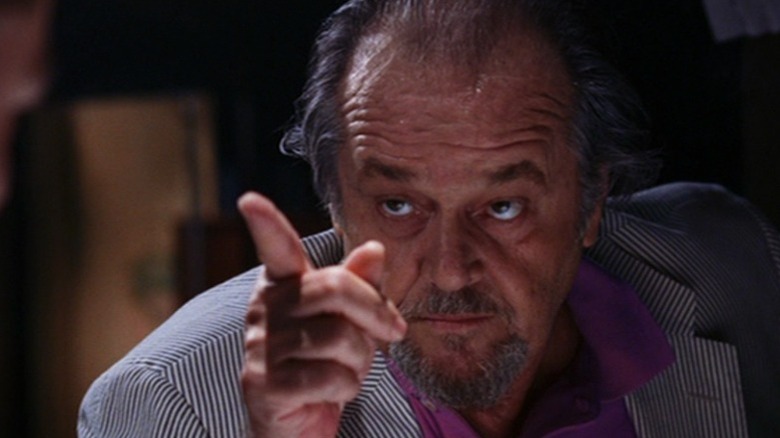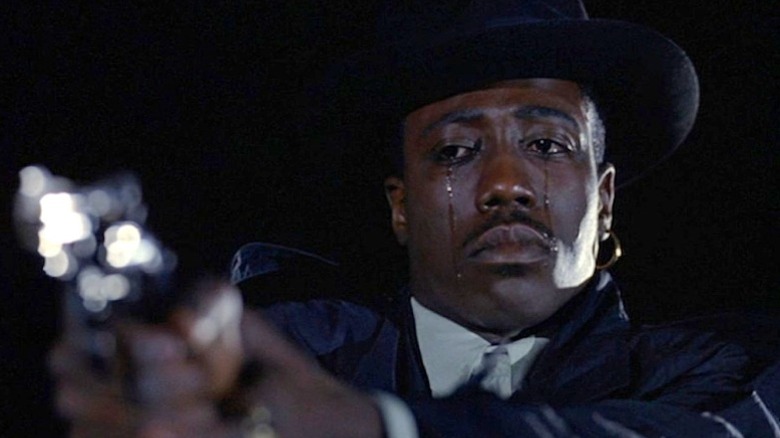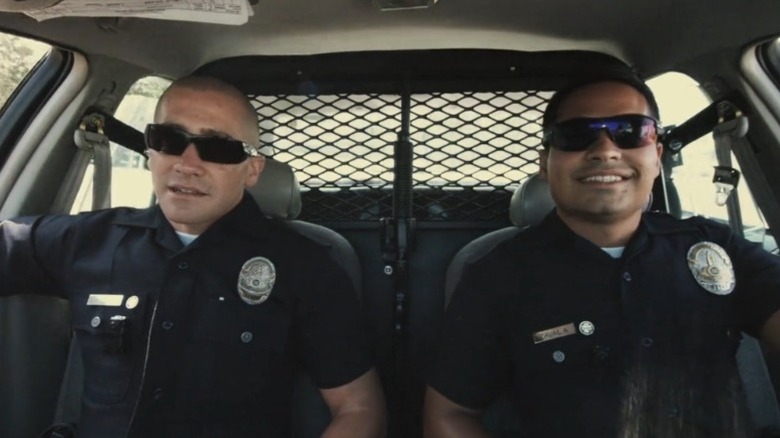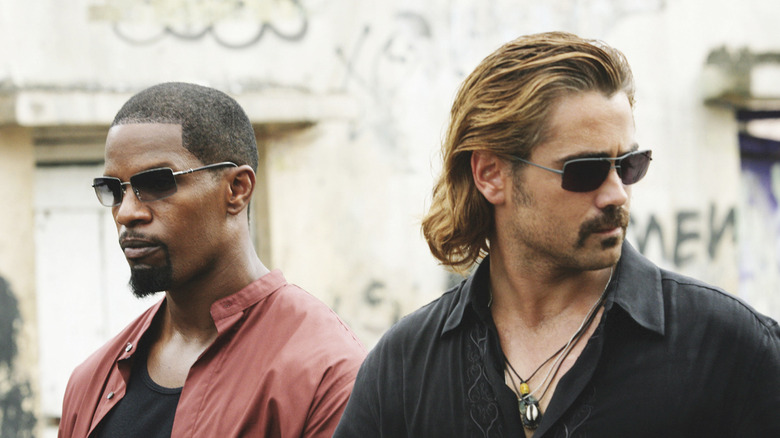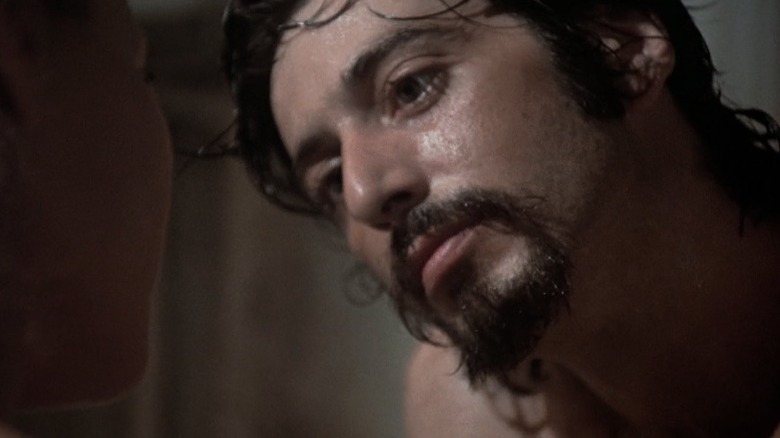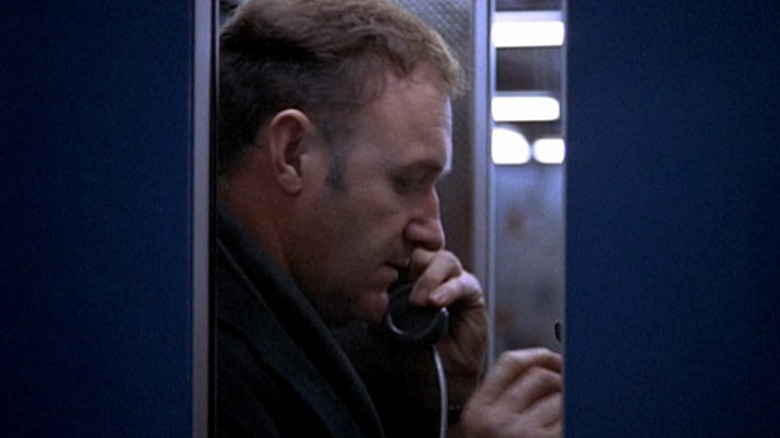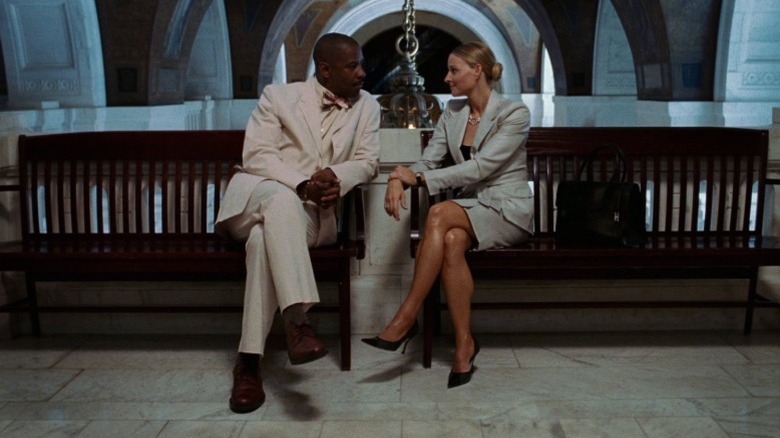12 Best Movies Like Training Day
An award-winning box office hit, 2001's "Training Day" is one of the most iconic cop movies of the 2000s. With direction by Antoine Fuqua and an original script by David Ayer featuring some elements loosely based on true events, "Training Day" is a single-day drama that follows up-and-coming LAPD officer Jake Hoyt (Ethan Hawke) as he partners up with renowned narcotics detective Alonzo Harris (Denzel Washington) for a 24-hour field evaluation in hopes of joining his squad.
Outwardly a taut and fast-moving police action thriller, "Training Day" snuck up on viewers in 2001 and earned a legion of fans with its utterly disarming character depth: In a gambit that earned Hawke an Oscar nomination and Washington his only career best actor win, both Alonzo and Jake gradually reveal themselves to be more complex, dynamic, and tragic characters than is initially apparent. If you're a fan of the way "Training Day" modulates rich and nuanced storytelling through well-executed crime thriller tropes, read on for a list of 12 other great films you owe it to yourself to give a watch.
American Gangster
One of Ridley Scott's biggest movies of all time starred Denzel Washington in a role tailor-made to showcase his simultaneous command of charisma and dramatic nuance. Written by Steven Zaillian and released in 2007, Scott's "American Gangster" chronicles, over 157 minutes, the rise and fall of North Carolina-born Harlem drug lord Frank Lucas.
The film begins with Lucas as the second-in-command to mob boss Bumpy Johnson (Clarence Williams III) in 1968, before Johnson's death prompts Lucas to start smuggling heroin from Thailand to the U.S. with the help of Vietnam War servicemen. Zaillian's script then follows Lucas for several decades, from his emergence as Harlem's most powerful crime kingpin until his operation is derailed by Newark police detective Richie Roberts (Russell Crowe).
Despite some measure of historical inaccuracy, "American Gangster" is a sleek, old-fashioned, propulsive drama that represents the best of what a gangster film can accomplish on a studio-sized budget. Washington and Crowe are both in top form, as is Ruby Dee in her Oscar-nominated role as Frank's seemingly oblivious mother Mahalee Lucas. It's a sturdy urban epic of the sort that any fan of "Training Day" has a good chance of falling in love with, even if its protagonist is situated on the opposite side of the law.
Prince of the City
One of director Sidney Lumet's most underrated films, "Prince of the City" stars Treat Williams as Danny Ciello, a fictionalized version of idealistic New York Police Department officer Robert Leuci, who helped expose corruption in the NYPD in the 1970s.
In Lumet's 1981 film, which he and Jay Presson Allen adapted from the eponymous 1978 non-fiction book by Robert Daley, Danny is part of a Special Investigative Unit that often partakes in illegal activity such as supplying drugs to be resold by informants. Danny is initially reluctant to help the U.S. Department of Justice, but agrees so long as he doesn't have to turn in his friends. Soon enough, however, the scale of the conspiracy going on within the police force begins to overwhelm Danny, and he finds himself at a moral crossroads.
If "Training Day" is the kinetic, popcorn-friendly antihero-centric version of a dirty cop narrative, "Prince of the City" is a denser, more ambivalent and meditative take on that same theme. Armed with his usual knack for sustaining anxiety and intensity, Lumet lays out Danny's psychological conflict as a nervous state of siege from conflicting societal and existential forces, painting a sprawling portrait of the tension between law and order, state and populace, and justice and power in 1970s New York City. It's terrific, thought-provoking entertainment, with a fantastically go-for-broke performance by Williams at its center.
21 Bridges
An under-discussed, originally unsuccessful, yet thoroughly well-made and engrossing 21st-century police action thriller that should be on the queue of any "Training Day" fan is 2019's "21 Bridges." Directed by Northern Ireland filmmaker Brian Kirk, known for his television work on shows like "Game of Thrones," "Penny Dreadful," "Luther," and most recently "The Day of the Jackal," "21 Bridges" stars Chadwick Boseman in one of his strongest, most magnetic starring vehicles, alongside the underrated Sienna Miller as his screen partner.
Boseman and Miller play NYPD detectives Andre Davis and Frankie Burns, who are assigned to the case of two small-time criminals (Stephan James and Taylor Kitsch) who have made off to Brooklyn with 50 kilograms of cocaine after a bloody shootout with police officers. Davis convinces his superiors to place Manhattan under temporary lockdown by sealing off its 21 river crossings, and he and Burns set out on an arduous manhunt for the two criminals — which leads them to uncover a bigger, even more dangerous conspiracy.
Another taut thriller about police partners trotting through a sprawling metropolis over the course of one day, "21 Bridges" could be understood as a kind of spiritual successor to "Training Day." It has a similarly rewarding command of narrative and cinematic tension, and an even twistier and more surprising central dynamic that finds both Boseman and Miller turning in career-highlight work. It's hard to understand why it wasn't a bigger financial hit.
Deep Cover
The 1990s were a golden period for tense, finely-wrought cop thrillers; when "Training Day" came out in 2001, it was very much situated within years' worth of solidified tradition in the genre. A particularly invaluable example of that tradition is 1992's "Deep Cover," which brought together director Bill Duke, cinematographer Bojan Bazelli, and star Laurence Fishburne in one of the most stylish, intelligent, enthrallingly dark and desolate neo-noirs that the past four decades of cinema have given us.
Fishburne, then a rising star in one of his first proper leading man roles, plays Russell Stevens, a Cincinnati police officer who gets recruited by the Drug Enforcement Administration to go undercover in a Los Angeles drug ring. Posing as "John Hull," Russell strikes up a partnership with drug-dealing attorney David Jason (Jeff Goldblum), and begins to work his way up the network of top cocaine importer Anton Gallegos (Arthur Mendoza).
Helmed by Duke with a bracing, almost experimental verve, "Deep Cover" puts singular editing rhythms and striking neon cinematography in service of a blunt, draining, yet totally compelling treatise on the sheer madness of the war on drugs. It's a precise character study of one conflicted man that doubles as an account of the human toll of an entire system of crime and violence. Fishburne rises to the occasion with one of his definitive performances, aided by Goldblum in one of his most riotously entertaining.
Shaft
After becoming the youngest nominee ever for the Academy Award for best director for his 1991 debut "Boyz n the Hood," John Singleton spent the '90s showcasing a remarkable versatility, moving from romance to sociological study to period drama. Then, in 2000, he made his most mainstream and commercial film yet in the form of "Shaft," a remake of Gordon Parks' eponymous 1971 blaxploitation classic. While its blockbuster obligations keep it from accessing the same level of epistemological acuity of Singleton's previous films, Singleton's "Shaft" is nonetheless guaranteed to be a rousing watch for "Training Day" enthusiasts.
Samuel L. Jackson plays John Shaft II, introduced as the nephew of Richard Roundtree's private eye from the 1971 film (later retconned into his son in Tim Story's 2019 "Shaft" legacyquel). A NYPD detective, Jackson's Shaft arrests wealthy playboy Walter Wade Jr. (Christian Bale), the son of a real estate mogul, for a racially motivated murder — but Wade manages to flee to Switzerland.
Two years later, he returns to the U.S., and Shaft embarks on a quest to ensure that Wade is brought to justice even as he makes use of his money and power to try to get away scot-free. The stage is thus set for a bombastic, outsized clash between two iconic actors, with Jackson's charisma filling every millimeter of the screen; meanwhile, Jeffrey Wright turns in one of the most memorable supporting performances of the 2000s.
The Departed
Somehow the only Martin Scorsese film to nab Academy Awards for best picture and best director (the latter being the only individual Oscar won by Scorsese himself, even as one of the most nominated directors in history), 2006's "The Departed" is a modern classic in the crime genre, and an essential text in the same matrix of dark, gritty 2000s cop cinema that "Training Day" is a part of. A remake of the 2002 Hong Kong film "Infernal Affairs," Scorsese's mid-period masterpiece follows the mirrored cat-and-mouse game between cops and criminals that unfolds when a state trooper (Leonardo DiCaprio) is tasked with going undercover in Boston's Irish mob — all while said mob also has a spy (Matt Damon) within the Massachusetts State Police.
On the level of storytelling verve alone, it's one of the most gripping, exciting, compulsively watchable films of Scorsese's career — a perfect, painstakingly laid-out diagram of tenuous covers and double-crossings and doubtful loyalties where tension is never not at a maximum. What makes it such a major film, however, is the richness with which it explores the social milieu of Boston in the 1980s and the interplay between the mob and the police — a deeply corrupt ecosystem where no one is truly innocent. Add to that the career-best performances from a wall-to-wall A-list ensemble, and the virtuosity of both Scorsese and editor Thelma Schoonmaker, and you've got yourself an unmissable thriller.
New Jack City
Mario Van Peebles, the son of legendary American filmmaker Melvin Van Peebles, has a robust career of his own as a film and TV director, in addition to similarly prolific work as an actor. And the arguable high point of Van Peebles' oeuvre as an auteur is the underrated 1991 gangster movie "New Jack City." A complex, crackling caper as indebted to Blaxploitation cinema as to Reagan-era social-issue urban dramas, the film stars Wesley Snipes as Harlem crack lord Nino Brown, and Ice-T as Scotty Appleton, a NYPD detective who infiltrates his network in an effort to take him down.
This is yet another example of a '90s classic that's directly part of the context in which "Training Day" came to be, and may be most easily recognizable among younger movie buffs as the source of the ubiquitous "Wesley Snipes pointing a gun while crying" GIF. The greatness of "New Jack City" extends far beyond its memeability, though: Hailing from a time when numerous American crime dramas were rushing — sometimes didactically — to make points about the horrors of the drug epidemic, it stands out for the creativity with which it carries itself as a film, complete with energetic action sequences, surprising nods to surrealism, and thoughtful ruminations on the cultural and cinematic legacy of Blaxploitation.
End of Watch
If a large part of the strength of "Training Day" lies in simply watching Alonzo Harris and Jake Hoyt go about their everyday grind as LAPD officers, then it's hard to think of a contemporary cop film that holds more built-in appeal for "Training Day" fans than 2012's "End of Watch."
Penned and directed by "Training Day" screenwriter David Ayer, starring Jake Gyllenhaal and Michael Peña as two LAPD officers tasked with patrolling South Central Los Angeles, "End of Watch" is a largely episodic chronicle of Brian Taylor (Gyllenhaal) and Mike Zavala's (Peña) workdays. It is only over time that a plot kicks in, involving the two cops' conflict with a powerful cartel — but by then, Ayer has given viewers ample time to soak in the effervescent friend chemistry between Gyllenhaal and Peña.
Shot intimately with handheld cameras and presented largely in a found-footage format justified by Taylor recording their activities for a college class, "End of Watch" wants you to feel the human element before the life-or-death stakes rear their head; for long stretches, it feels almost like a hangout-movie variation of a buddy cop flick. Which, of course, only makes the eventual emergence of drama and violence all the more harrowing, and allows Gyllenhaal and Peña to turn in grand, devastating performances entirely on par with those of Denzel Washington and Ethan Hawke in "Training Day."
Miami Vice
Between 1984 and 1989, NBC's "Miami Vice" gave a new spin to the cop show series by suffusing it with color, a balmy mood, pop culture trendiness, and innumerable cameos by famous actors. Years later, Michael Mann, one of the show's producers, brought a similarly trailblazing spirit to the police thriller genre with his 2006 big-screen adaptation of "Miami Vice."
Scripted and directed by Mann himself, "Miami Vice" became notable as one of the first full-bodied Hollywood forays into digital filmmaking, featuring some of the most entrancingly sharp, grainy, and idiosyncratic vistas yet seen in Mann's oeuvre — scenes of Florida heat with blown-out white skies and sun streaks, sweat glowing uncannily on foreheads, neon lights engulfing the screen in flat color blocks.
The movie is famous for that, yes, but the fun of it doesn't stop at aesthetics. For "Training Day" fans, the raucous adventures of Miami-Dade Police detectives James "Sonny" Crockett (Colin Farrell) and Ricardo "Rico" Tubbs (Jamie Foxx), as a typical cartel investigation entangles them in increasingly personal and apocalyptic stakes, should scratch a similar itch to the trials of Alonzo and Jake. "Miami Vice" is another movie that understands the fundamental thrill of a frantic tumble through the dark corners of a crime-laden city, and similarly places us in the company of two great stars for the ride — with both Farrell and Foxx anchoring Mann's audiovisual experiments to a persistent sense of desperate, vulnerable humanity.
Serpico
"Prince of the City" is not the only Sidney Lumet film that may entice fans of "Training Day." As a matter of fact, it's not even the only Sidney Lumet film to deal with police corruption in New York City in the 1970s — Lumet's earlier foray into the subject, 1973's "Serpico," is even more famous and well-remembered. Based on Peter Maas' 1973 book, "Serpico: The Cop Who Defied the System," and the true story of the notorious Knapp Commission, Waldo Salt and Norman Wexler's script chronicles how one man caused a political uproar simply by being candid about what he had seen.
That man was Frank Serpico, played here by Al Pacino in one of his signature performances (and one he was genuinely relieved not to win the Oscar for). In the film, Serpico graduates from the police academy with big ideas, but becomes so frustrated with the blatant corruption in the force that he eventually makes the decision to blow the whistle — leading to retaliation and even threats from his colleagues. Much like "Prince of the City," it's a film that exemplifies the extent to which Lumet codified the language of the urban crime saga from which Antoine Fuqua was drawing in "Training Day," and the fact that Pacino's Serpico is an eminently moral and honest man doesn't subtract one bit from the film's mastery of ambivalence and bitter truth.
The French Connection
Winner of the 1972 Academy Award for best picture, William Friedkin's "The French Connection" is as straight-to-the-point as action movies come: French drug trafficker Alain Charnier (Fernando Rey) is trying to smuggle a massive shipment of heroin into the United States, and NYPD detective Jimmy "Popeye" Doyle (Gene Hackman, in the best movie of his extensive career) is hot on his trail.
Friedkin's filmmaking has seldom been more physical or diagrammatically precise than in this, a study of the city as a map of possibility and danger. "The French Connection" sometimes anticipates video game language in its charting of Popeye's race up and down the streets of New York. As a pure action-thriller procedural, it's one of the defining forebears not just of "Training Day" but of everything made in the genre since 1972. Leaning away from the operatic melancholy of classic noir, Friedkin emphasizes an urgent, no-frills materiality that single-handedly laid the groundwork for the modern era of pragmatic cop films.
More impressively, Friedkin and screenwriter Ernest Tidyman manage to communicate a whole psychological storm brewing inside of Popeye throughout the high-octane chases. Gene Hackman's Oscar-winning performance is arguably the key precursor to Denzel Washington's — bringing, as it does, a sense of messy, wounded, complicated interiority to a man outwardly presenting himself as a tough cop focused only on the task at hand.
Inside Man
The highest-grossing film of Spike Lee's directorial career also demonstrates his singular ability to have it both ways: When Lee wants to make an efficient meat-and-potatoes crime thriller, he can, and you can rest assured your palms will sweat and your adrenals will be worked. But Lee also knows exactly how to subtly make a great heist movie like "Inside Man" even more than what it seems on the surface.
This 2006 hit film stars Denzel Washington as an NYPD hostage negotiator facing off against an ambitious bank robber with a highly elaborate plan (Clive Owen). It's a cop role that lets you see a diametrically opposite side to the one Washington shows in "Training Day": cool, precise, and reserved rather than imperious and volcanic. It's worth a watch just as a display of Washington's stunning versatility, as well as a prime showcase for an all-around incredible cast — also featuring Jodie Foster, Chiwetel Ejiofor, Christopher Plummer, and Willem Dafoe.
But if the tension and grit of "Training Day" speak to you, then there's plenty more to get out of "Inside Man" as a thematically ambitious genre exercise. It's a movie of abundant thrills and zero false moves, which then also reveals itself, in typical Lee fashion, as a careful and observant study of the political and societal mechanics of New York City — with room for intrepid critiques of the very police force to which its would-be heroes belong.
